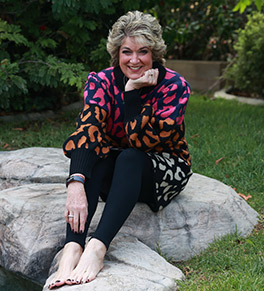Curing Cushing disease without scars
Pituitary tumor removed through the nose by skull base surgeons

“I know beyond a shadow of a doubt that I wouldn’t be here if not for the prayers of family and friends — and the doctors at UCI Health,” says Carolyn Tormey. Photo by Kimberly Pham
All her life, Carolyn Tormey had energy and stamina to spare. A lifelong athlete, she ran track and studied ballet as a teenager. She later danced her way to two national ballroom championships. In her 40s, she took up dressage and dreamed of becoming an Olympic equestrian. In her 50s, she turned to boxing, teaching Zumba and competing in triathlons.
After a successful career in orthopedic devices, Tormey and her dentist husband, Pat, launched nonprofit groups to provide education and healthcare to children in Kenya and Uganda. She raised millions of dollars for her church and health organizations. She relished activities with her three children and four grandchildren.
In 2019, everything changed. The Yorba Linda resident’s energy began to flag so much she would retreat to her car to rest mid-grocery shopping. She often found herself weeping for no reason. She gained 45 pounds despite eating healthy and working out at least two hours a day. Her face and midsection puffed up.
Her regular doctor suspected a rare endocrine condition called Cushing disease, which causes the body to overproduce cortisol, and referred Tormey to a community endocrinologist, who dismissed the diagnosis and put her on a series of fasts and other diets. Nothing worked.
“To have all the energy in the world, then to have it just disappear … ” Tormey leaves the sentence unfinished as tears smother her voice. “My whole life was shutting down. I went from being this active, joyful person galloping through life to not even having energy to go out to dinner. I had to resign from all my boards and groups. It was horrendous.”
Nearly a year later and frustrated, she sought help at UCI Health, where an endocrinologist looked at her and at older photos she brought with her and instantly confirmed what Tormey and her primary care doctor had suspected, she did indeed have Cushing disease.
Too much cortisol
This under-recognized condition affects at least 10 million people a year worldwide — women more often than men. The cause is often a tumor on the pituitary gland that tricks the body into manufacturing excess cortisol, the fight-or-flight hormone.
“Cortisol is a naturally existing hormone we need to handle stress,” explains neurosurgeon Dr. Frank P.K. Hsu., co-director of UCI Health Skull Base Surgery Services and chair of the UCI School of Medicine's Department of Neurological Surgery. “Too much puts your body in a constant high-stress state that takes a toll.”
Excess production of cortisol causes the body to conserve calories, leading to rapid weight gain, muscle weakness and fatigue. Left untreated, Cushing disease can cause bone loss, type 2 diabetes, cardiovascular disease and even death. An initial diagnosis is often difficult because patients have varied symptoms.
Once doctors were able to determine the source of the excess cortisol by finding high levels of the hormone in blood near Tormey’s pituitary gland. She underwent a brain scan, which detected a microscopic tumor on the pea-sized gland.
A delicate operation
Less than a week later, she was on the operating table with Hsu and UCI Health otolaryngologist Dr. Edward Kuan, director of endoscopic skull base surgery.
First Kuan first threaded an endoscope through Tormey's nose to the pituitary gland. Working side-by-side, he and Hsu viewed their progress on two large monitors, one that displays the endoscopic image, the other acting like a GPS system inside the skull. When they could see the pituitary gland, Hsu found and removed a benign tumor.
“He shows me the tumor; I dissect it,” Hsu explains. “Our four ‘hands’ are in there all the time.”
Because the gland sits beneath the brain, just behind the nose in an area crowded with optic nerves and carotid arteries, it takes considerable skill and experience to operate in so delicate an area where there is little margin for error.
Hsu says their multidisciplinary skull base team has plenty of experience, performing hundreds of minimally invasive and open surgeries each year. He also credits their stellar team of intensive care specialists and other experts who can anticipate and address any challenges that may emerge during and immediately after this delicate surgery.
Hitting her stride
When Hsu met with Tormey after surgery, he told her that the tumor he removed had been attached to the pituitary gland in three spots, leading them to suspect multiple tumors.
The next morning, her cortisol level had dropped from a jaw-dropping 85 to 1, a sign that the surgery had stopped the excess production of the hormone. Once her pituitary gland resumed working properly, her cortisol level stabilized at 12, within the normal range of 10 to 23.
Three weeks later, Tormey says she lost most of the excess weight even though she couldn’t yet resume exercising.
A complete return to normal has been hampered by other health problems, but she’s on her way. Tormey is planning to run a triathlon by her 63rd birthday in June 2023.
“When someone asks, ‘How are you?’ I tell them, ‘I’m grateful to be alive,’” she says.
“I know beyond a shadow of a doubt that I wouldn’t be here if not for the prayers of family and friends — and the doctors at UCI Health.”





